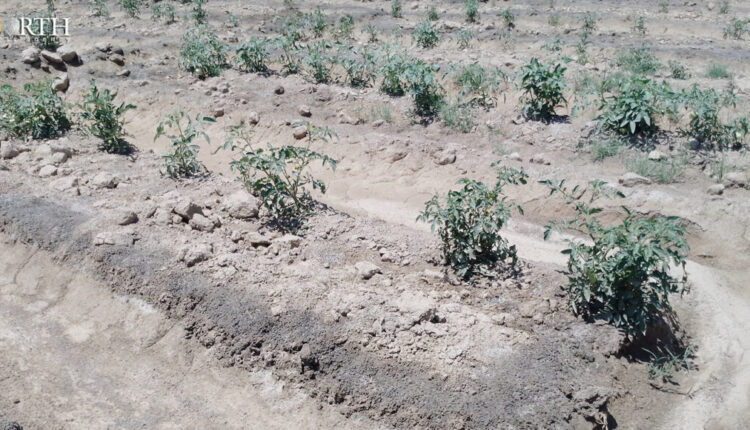Al-Hussein has extended the land reserved for growing summer vegetables this year after their prices increased in the market. He also wants to use them to make persevered food for the winter in order to cut down on expenses, as vegetable prices usually skyrocket.
Fayad al-Hussein, 30, a resident in the town of al-Karama 35km east of Raqqa, north Syria, run by the Autonomous Administration of North and East Syria (AANES), cultivated two and a half acres worth of summer vegetables. The space of land he planted covers his family’s needs for vegetables all summer.
The AANES was first formed in 2014 in the Kurdish-majority regions of Afrin, Kobani and Jazira in northern Syria following the withdrawal of the government forces. Later, it was expanded to Manbij, Tabqa, Raqqa, Hasakah and Deir ez-Zor after the SDF defeated ISIS militarily there.
Many landowners in Raqqa are planting summer vegetables and expand their farming to achieve self-sufficiency and to use and preserve them for the winter to decrease expenses. Despite the high costs of planting vegetables this year, al-Hussein expanded his cultivated area and bought seedlings at high prices. He said the costs of planting his vegetables are nothing compared to what he buys from the market. Tomatoes are sold at over 3,000 Syrian Pounds (SYP, about $0.35) each kilo, and cucumbers at 2,000 SYP ($0.26). Prices of some kinds can reach 7,000 SYP ($0.80), and others, such as okra, are sold at 50,000 SYP ($5.68) per kilogram. He bought vegetable seedlings for farming and also set up greenhouses (‘Mastaba’) for which he expended a lot of money for seeds, plastic covers, and iron bars. He planted many kinds of vegetables, such as tomatoes, beans, eggplants, okra, cucumber, and onions, so that he would not have to buy from the market at high prices.
On the other hand, Ali al-Ali, 31, a resident from al-Jadidat, 50km east of Raqqa, asked his neighbor for a small part of his land to grow summer vegetables, as he does not own land. His neighbor did not hesitate to let him use an acre of the land. Al-Ali, prompted by his difficult living conditions, preferred to buy seeds and seedlings for cultivation so that he can avoid having to buy vegetables from the market. This piece of land granted by his neighbor will help him be self-sufficient in the summer and secure the preserved food for the winter. He told North Press that more people are farming summer vegetables, pushing the owners of greenhouses (‘Mastaba’) to raise the prices of seedlings from 15 SYP to 75 SYP.
‘Mastaba’ is used by farmers to plant seedlings prior to their season in early February every year. They dig the land by about 30cm and spread soil mixed with sheep dung. Then plant the seeds, cover it to help them grow, and protect it from the cold in preparation for farming at a later season. This year, root-eating insects spread in great numbers, mostly mole crickets, forcing farmers to buy other seedlings and replant them.
Khaled al-Khalaf, 36, a resident from the village of al-Bayder, north of al-Karama, planted summer vegetables like most people in the countryside of Raqqa. Even though he owns land and has cultivated a section of it with vegetables, he tried to make use of the large space of land in his yard and planted it with some vegetables as well. He told North Press that he looked for insecticide in all agricultural stores, but none did any good, causing losses for farmers, who are nevertheless not discouraged from continuing farming.
The farmers hope to have a prosperous harvest. It is considered a farmer’s tradition and they plant vegetables every year, but this year, it is a necessity. Due to the ongoing 12-year-old war Syria has been witnessing, residents across Syria have been affected in light of increasing prices, inflation, and devaluation of the Syrian pound against the USD, forcing many to depend on their lands production.

